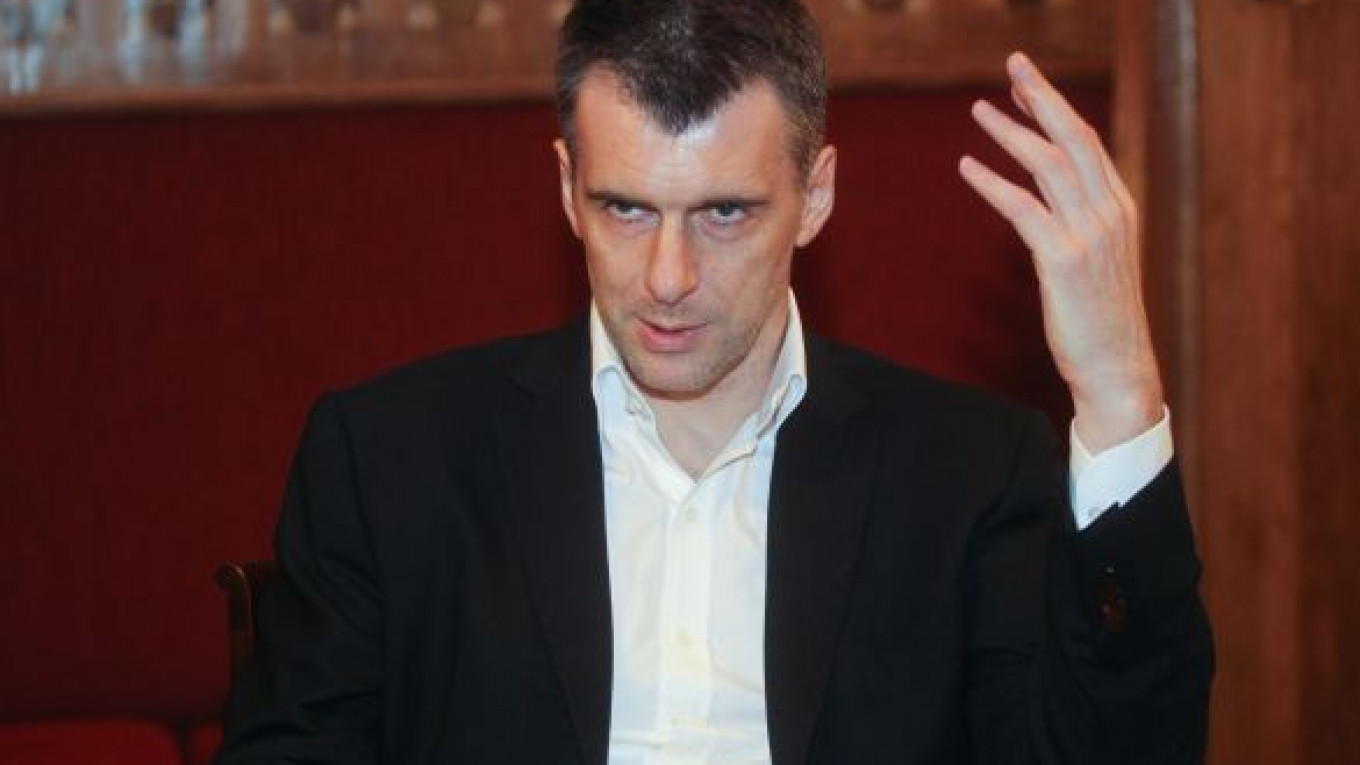Tycoon-turned-politician Mikhail Prokhorov and a fellow businessman have taken control of a 47 percent stake in potash firm Uralkali and plan to appoint a new CEO who could revive a partnership with Belarus, a source close to the matter said.
Uralkali, the world's biggest potash producer, quit a trading alliance with Belarus in July that controlled 40 percent of the $20 billion global market of the crop nutrient in order to focus on maximizing sales volumes.
The move triggered a plunge in the price of potash and infuriated Belarus, where the sliding price hit export earnings.
"They will try to solve the conflict now," a source, familiar with new shareholders' plans said Friday.
Shortly after scrapping the deal with Belarus, Uralkali CEO Vladislav Baumgertner was detained in that country's capital, Minsk, and charged with abuse of power and embezzlement.
Baumgertner remains under house arrest after his extradition to Moscow. Uralkali has steadfastly defended Baumgertner and denied any wrongdoing.
A change in shareholding at Uralkali has since seen tycoon Suleiman Kerimov sell out. Belarus' president, Alexander Lukashenko, had demanded Kerimov's exit as a precondition for a revival of the alliance.
The incoming boss will be deputy chairman of fertilizer firm Uralchem, Dmitry Osipov, another source familiar with the shareholders' plans said. Osipov, 47, was CEO of Uralchem from 2007 until 2011. Uralkali declined comment on the potential change at the helm.
"Baumgertner had to go," said Bruce Bower, a partner at Moscow hedge fund Verno Capital, adding the governments of both Russia and Belarus were unhappy with him as Uralkali had damaged the bilateral relationship between them.
The shareholder change sees Prokhorov's investment vehicle, Onexim Group, complete a previously announced deal to buy a 21.75 percent stake in Uralkali from Kerimov, Onexim said.
Firms close to Prokhorov are also buying 5.34 percent of Uralkali on the market, two sources familiar with the deal told Reuters. They are acquiring the stake from firms close to Kerimov, one of sources added. Onexim declined to comment.
Meanwhile, Dmitry Mazepin's fertilizer firm Uralchem, completed a previously agreed deal to buy a further 20 percent stake in Uralkali from Kerimov's partners, Uralchem said.
Prokhorov's and Mazepin's combined stake will rise to 53 percent in 2014, when Uralkali plans to cancel 12 percent of its shares it holds in treasury.
Reviving the potash alliance could help Belarus, but experts say industry overcapacity may make a deal hard to achieve.
"A negotiation process would not be fast," said sector analyst Boris Krasnojenov of Renaissance Capital in Moscow.
"There are many points that could be discussed. Plus, if we move back to a 'price over volume' strategy, someone would have to slash production, and Uralkali is unlikely to be interested in doing it," Krasnojenov said.
Uralkali has not ruled out reviving the partnership and said Thursday it would also consider new trading joint ventures to replace the alliance. It plans to boost 2014 potash production by 20 percent.
It remains unclear when talks with Lukashenko might start and whether the new CEO appointment would also mean changes in Uralkali's sales department, currently headed by Oleg Petrov.
A Message from The Moscow Times:
Dear readers,
We are facing unprecedented challenges. Russia's Prosecutor General's Office has designated The Moscow Times as an "undesirable" organization, criminalizing our work and putting our staff at risk of prosecution. This follows our earlier unjust labeling as a "foreign agent."
These actions are direct attempts to silence independent journalism in Russia. The authorities claim our work "discredits the decisions of the Russian leadership." We see things differently: we strive to provide accurate, unbiased reporting on Russia.
We, the journalists of The Moscow Times, refuse to be silenced. But to continue our work, we need your help.
Your support, no matter how small, makes a world of difference. If you can, please support us monthly starting from just $2. It's quick to set up, and every contribution makes a significant impact.
By supporting The Moscow Times, you're defending open, independent journalism in the face of repression. Thank you for standing with us.
Remind me later.






